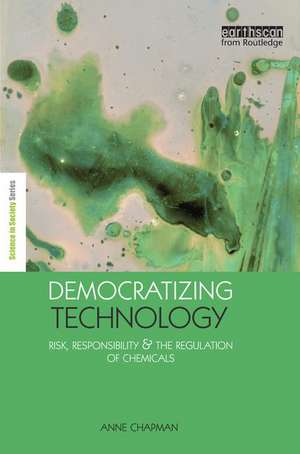Democratizing Technology: Risk, Responsibility and the Regulation of Chemicals: The Earthscan Science in Society Series
Autor Anne Chapmanen Limba Engleză Paperback – 25 noi 2016
Din seria The Earthscan Science in Society Series
-
 Preț: 340.37 lei
Preț: 340.37 lei -
 Preț: 340.37 lei
Preț: 340.37 lei -
 Preț: 198.19 lei
Preț: 198.19 lei -
 Preț: 488.29 lei
Preț: 488.29 lei -
 Preț: 382.75 lei
Preț: 382.75 lei -
 Preț: 456.06 lei
Preț: 456.06 lei -
 Preț: 424.58 lei
Preț: 424.58 lei -
 Preț: 418.67 lei
Preț: 418.67 lei - 18%
 Preț: 1017.91 lei
Preț: 1017.91 lei -
 Preț: 469.34 lei
Preț: 469.34 lei - 21%
 Preț: 378.39 lei
Preț: 378.39 lei -
 Preț: 412.37 lei
Preț: 412.37 lei -
 Preț: 449.41 lei
Preț: 449.41 lei -
 Preț: 469.34 lei
Preț: 469.34 lei - 13%
 Preț: 333.12 lei
Preț: 333.12 lei -
 Preț: 416.22 lei
Preț: 416.22 lei -
 Preț: 413.33 lei
Preț: 413.33 lei -
 Preț: 116.59 lei
Preț: 116.59 lei -
 Preț: 411.42 lei
Preț: 411.42 lei - 22%
 Preț: 332.02 lei
Preț: 332.02 lei - 15%
 Preț: 463.46 lei
Preț: 463.46 lei -
 Preț: 444.62 lei
Preț: 444.62 lei - 18%
 Preț: 1001.87 lei
Preț: 1001.87 lei - 18%
 Preț: 1114.64 lei
Preț: 1114.64 lei -
 Preț: 392.24 lei
Preț: 392.24 lei -
 Preț: 390.54 lei
Preț: 390.54 lei -
 Preț: 357.43 lei
Preț: 357.43 lei - 18%
 Preț: 1054.71 lei
Preț: 1054.71 lei -
 Preț: 444.62 lei
Preț: 444.62 lei - 18%
 Preț: 1278.88 lei
Preț: 1278.88 lei - 26%
 Preț: 764.20 lei
Preț: 764.20 lei
Preț: 299.52 lei
Preț vechi: 341.55 lei
-12% Nou
Puncte Express: 449
Preț estimativ în valută:
57.31€ • 59.84$ • 47.43£
57.31€ • 59.84$ • 47.43£
Carte tipărită la comandă
Livrare economică 04-18 aprilie
Preluare comenzi: 021 569.72.76
Specificații
ISBN-13: 9781138967403
ISBN-10: 1138967408
Pagini: 192
Dimensiuni: 156 x 234 mm
Greutate: 0.45 kg
Ediția:1
Editura: Taylor & Francis
Colecția Routledge
Seria The Earthscan Science in Society Series
Locul publicării:Oxford, United Kingdom
ISBN-10: 1138967408
Pagini: 192
Dimensiuni: 156 x 234 mm
Greutate: 0.45 kg
Ediția:1
Editura: Taylor & Francis
Colecția Routledge
Seria The Earthscan Science in Society Series
Locul publicării:Oxford, United Kingdom
Cuprins
Preface * Acknowledgements * Introduction * What is Technology? * Technology as World-Building * Technology, Science and the Economy * The Regulation of Chemicals * Risk * Assessing Risks from Chemicals * The Ethical and Political Framework of Regulation * Responsibility * Making Decisions about Technology * Index
Notă biografică
Anne Chapman, a former environmental consultant, has a degree in biochemistry and a PhD in philosophy, and is involved in environmental campaigning and green politics.
Recenzii
'Democratizing Technology is an interesting book with contorversial opinions and proposals. [...] The book is a good candidate for the start of many interesting discussions in and out the classroom. Recommended.'R.E. Buntrock, formerly, University of Maine, USA'Where the book excels is the thoughtful exploration of questions of profound relevance to public health, such as divergence between our understanding, our behaviours and public policies with respect to risk and responsibility. The analysis provides innovative insights for behaviouralists, policy development in both theoretical and practical spheres, ethicists, political analysts, environmental health scholars and all who encounter technology, and wonder about how we personally and collectively respond to technology in our midst.'Australian and New Zealand Journal of Public Health'An interesting book with controversial opinions and proposals... Recommended'Choice
